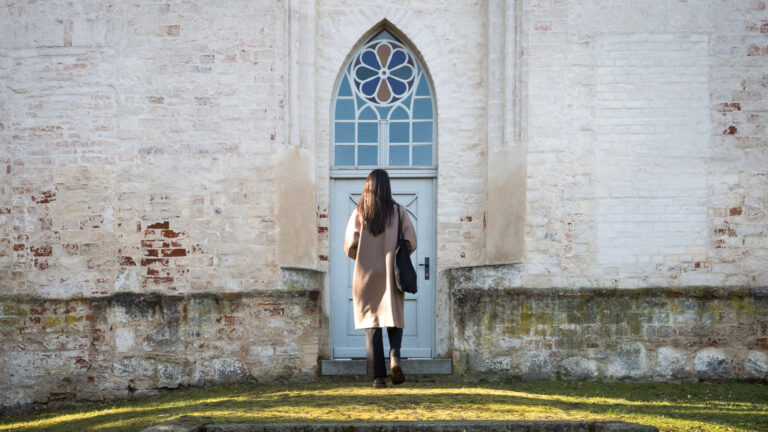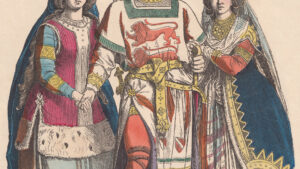When the Unicorn enters true Narnia at the end of C. S. Lewis’s beloved series, he bursts into an exclamation: “I have come home at last! This is my real country! I belong here. This is the land I have been looking for all my life, though I never knew it till now.”
We relate to this ache for a place we’ve never been, the heavenly home for which we were created. We can barely wait for the fulfillment of our joy, when “hope shall change to glad fruition, faith to sight, and prayer to praise.”
That all sounds good on paper, but then real life hits: political turmoil, cultural upheaval, spiritual struggle, war, strife, persecution. The values of the kingdom of God sometimes seem far and remote, while the world around us feels like it’s the only thing that’s real.
The tension for the Christian, then, lies in how we live according to the values of home, when home is a place we’ve never seen. Can we be true to who we are as a people when we’re stretched and pressed and crushed by the values of an increasingly secular society? Are we to isolate ourselves from the world or immerse ourselves in it?
The tension for the Christian lies in how we live according to the values of home, when home is a place we’ve never seen.
The apostle Peter writes that “you are a chosen race, a royal priesthood, a holy nation, a people for his own possession, that you may proclaim the excellencies of him who called you out of darkness into his marvelous light” (1 Pet. 2:9). We have our identity, and we have our marching orders. But what about the friction between who we are as kingdom citizens and who we are as citizens of other nations, scattered across the globe? How much of your identity stems from your true home, and how much have you absorbed from the culture around you?
Fighting for Wakandan Identity
At the beginning of Marvel’s latest film, Black Panther, we see the Wakandans are at once isolated and dispersed across the globe, with some of its young citizens never having seen their home country, and many others keeping to themselves, safe within the country’s borders. Those who already live in the mystical land of advanced technology and strong African culture are increasingly pressed upon by threats from the outside. In a world ravaged by war and colonialism, can Wakanda stay true to who it is?
The Black Panther himself, T’Challa (Chadwick Boseman), son of T’Chaka (John Kani), embodies this tension. In a Marvel universe dominated by superheroes patrolling the globe, T’Challa wonders if there is room for an African ruler whose values find him out of step with the imperialist countries that dominate the world stage. At the same time, the Black Panther struggles with his own place in his family tree and how to deal with his ancestors’ failures. At a moment in our history when globalization, technology, and other factors are blurring lines (and creating clashes) between local, national, and global cultures, this is a timely discussion.
The thread of identity winds throughout Black Panther. When civil war threatens to tear the Wakandans to pieces, their identity holds them together. When a misguided ruler plans to use Wakanda’s resources to fund revolutions across the globe, its citizens face the difficult tension between ambition for greatness in the world and staying true to who they are as a people. Every Wakandan is forced to weigh identity as a peace-loving, prosperous people against the strong temptation to rise up and become a world power.
‘Black Panther’ Elevates the Marvel Cinematic Universe
It’s notable that Marvel released Black Panther with discussions of racial identity on the national stage. The film wears its African origins and culture on its sleeve, striking all the right notes without ever feeling cheap or gimmicky. It invites America and the world to see the themes of the Marvel universe through black eyes. At the same time, it avoids the pitfalls of cashing in on a tumultuous time in American history to score cheap political points. Its themes and points of discussion feel real and weighty rather than quickly brushed-over.
All of this means that Black Panther barely feels like a Marvel movie—probably a good thing, given the diminishing returns the Marvel Cinematic Universe will inevitably experience as samey film after samey film plods on in theaters, year after year. We can only watch the Avengers band together to save the world, while firing off Joss Whedon-penned quips, so many times.
Commentary on American exceptionalism and imperialism, clumsily touched on in Captain America: Civil War, finally gets room to breathe here in Black Panther. It’s not hard to draw a connection from the Wakandans’ internal struggles to the United States and our place in the world. Who are we as Americans? Are we to take American ideals to the far reaches of the earth, or is celebrating the free trade of diverse knowledge and ideas more consistent with who we are? Wakanda becomes a mirror for us to think long and hard about the kind of nation we have been and might be.
Mirror and a Question
As Christians, we have a more deeply ingrained identity as citizens of God’s kingdom, and our challenge is to figure out what that looks like. How does our Christian identity inform and expand our cultural identity? What are the implications of the fact that our Christian identity unites us to people across cultures, borders, and bloodlines? T’Challa tells the UN, “More connects us than separates us,” and that’s a powerful rallying cry for Christians spread throughout the world, a people made up of wildly different backgrounds and cultures.
‘More connects us than separates us’ is a powerful rallying cry for Christians spread throughout the world, a people made up of wildly different backgrounds and cultures.
[Spoilers below] In Black Panther’s powerful concluding scene, T’Challa returns to the place his father murdered his uncle many years before, in urban Oakland. A wide-eyed black youth approaches and asks him, “Who are you?” We aren’t given a response. The movie fades to black and the credits roll. The audience is left not with answers but with the echo of that important and timely question.
Who are we? Black Panther may not provide an answer, but it does provide clarity. If we are to find our place in the world, we must first return home.
Try Before You Buy: FREE Sample of TGC’s New Advent Devotional

Choosing the right Advent daily devotional can be tough when there are so many options. We want to make it easier for you by giving you a FREE sample of TGC’s brand-new Advent devotional today.
Unto Us is designed to help you ponder the many meanings of this season. Written by TGC staff, it offers daily Scripture readings, reflections, and questions to ponder. We’ll send you a free sample of the first five days so you can try it out before purchasing it for yourself or your church.




























